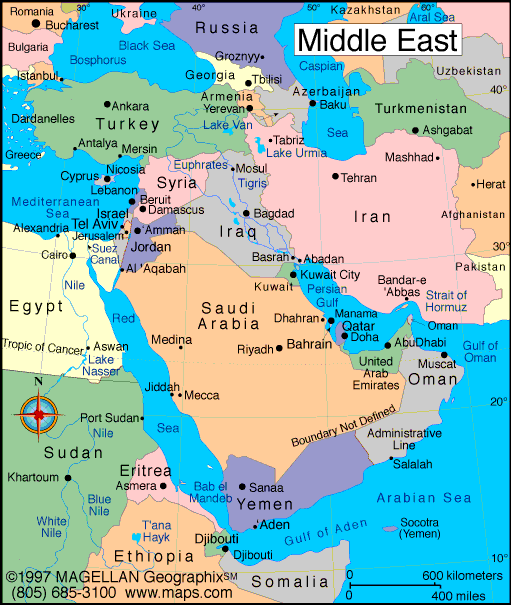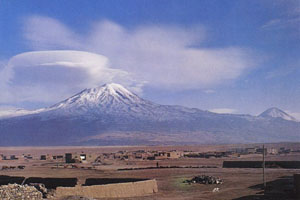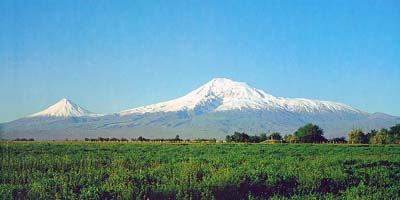I was trying to keep my nose out of this, but it got the best of me. Ok, local flood or not, Rich's article doesn't make sense.
Pslam 104
It is debatable whether or not this is a "creation psalm." But even if it is, it is not true that "a global interpretation of the Genesis flood requires that certain non-flood-related verses of the Bible contradict each other." Ps. 104:9, along with 33:6-7; Pro. 8:29; and Job 38:4, 8 can all rightly be taken to be general references to God's power in the act of creation. In biblical times, the sea was thought to be uncontrollable, so if anyone could control it, they were truly powerful indeed. To say that PS. 104 means that the sea can "never again" cross its "boundaries" is taking it far beyond its intended meaning. Indeed, if Rich is going to be consistent, he has to recognize that the ocean has changed boundaries many times. Every day, every year, it changes its boundaries through natural processes.
Kol erets translated as "whole land"
On one hand, Rich is absolutely correct here. The Hebrew words
kol erets can be translated as "the whole land." But there are a few problems with this statement. First, as Rich himself notes, "of the 205 instance of kol erets in the Old Testament, it might refer to the entire planet just 40 times." So, beyond the simple fact that
kol erets can be properly translated "entire earth," there are instances in the Bible where it does just that. So, we have both a semantic possibility as well as a semantic precedent. Secondly, the word
kol is used emphatically, and this must be true whether or not the flood is local or global. Ask yourself, what is the difference between saying, "The flood covered the land/earth" and "The flood covered the entire land/earth"? It is one of emphasis. Now, the noun in question is not
kol ("all"), but rather
erets ("earth/land"). And is there a place in the context where
erets refers to the entire planet? Genesis 1:1. If, then, Rich wants to be consistent, he should take
erets in 1:1 to be the land as well as in the flood account.
He, and others, will rightly point out that we can determine from the context that
erets must be taken in 1:1 to be the entire planet. Thus, he will agree with the standard rule of all hermeneutics that a word's meaning must be determined by its context. In that case, we should ask ourselves if the
context indicates the earth or the land. We'll take up his arguments for the latter below and note, in passing, that arguments for the former should be considered on their own merits.
Tebel as "Entire Earth"
Rich's argument that the word
tebel "always refers to the entire earth or the entire inhabited earth" and thus would have been a better word to use falls on two grounds. First, it is an argument from silence. All agree that
erets both can and often does refer to the earth. In fact, had Moses used
tebel here, any right thinking scholar would question whether or not one of the meanings within
tebel's semantic range wasn't "land"! The second point is more simple: the word only occurs in the poetic texts, and thus is not expected in Genesis 1-11. Moreso, Moses
never uses it. In fact, he never even uses the root that the word comes from! So to ask him to use it here is simply inappropriate.
Beyond that, Rich comes dangerously close to either being factually wrong or misleading. While he does note that it can refer to the "entire inhabited earth," he is wrong that it must refer to the
entire inhabited earth. It can, in fact, simply refer to countries. So the TWOT states:
- Tebel is sometimes limited to "countries" or "the inhabitable world." This meaning is more closely related to the root meaning. It refers to the world where crops are raised. This is observed in the judgment message against the king of Babylon (not Satan) for violently shaking the "world" or "inhabitable world" (Isa 13:11); 14:17). Lightning is said to enlighten the "world"--undoubtedly referring to a limited land area (Ps 77:18; 97:4)
Not, then, to belabor the point, but
tebel would have been an inappropriate choice for several reasons. Its lack-of-usage cannot be construed to be evidence for a local flood nor can it be argued that it would have been a better word choice to convey the meaning of "entire planet."
Erets as "Land"--contextual considerations
Rich cites three passages in which
erets must be translated "land" as a contextual basis to understand the flood as local: 6:11, 12; 9:13. Concerning 6:11:
- Now the earth was corrupt in the sight of God, and the earth was filled with violence.
It is interesting he would take the first as "land" and not the second, even though they are both the same word. I, for one, have absolutely no problem taking the first
erets to be "earth," especially given the meaning of "corrupt" (to be spoiled). Given the fact that mankind was to rule over the earth (
erets), and given the fact that the
erets was filled with man's violence--especially that this second instance certainly does refer to, if nothing else, the entire inhabited earth (
tebel, anyone!?), there is no reason not to take the first instance in the same way.
Verse 12 just restates the previous verse, so it does no good to appeal to it.
9:13 is interesting--or, at least Rich's take on it is. Without going into too much detail, Rich agrees that the flood was universal in the sense that it killed all of humanity. It seems rather hollow, then, for God to make this grand promise not to kill everyone with a flood again if He is not capable of doing so because He had already declared that to be impossible at the Creation event (Ps 104, according to Rich). If, though, you take the "earth" to refer to the entire earth, as it traditionally is, then the passage makes perfect sense.
ALL <> ALL
"It is clear from the text that "all flesh" did not actually refer to all flesh, since there was at least one exception." Now he's just grasping at straws. Just earlier, Rich himself argued that the flood was universal in that it killed all people. "God's judgment of humans was universal (with the exception of Noah and his family)." Further, according to Rich's standard, the local flood contradicts itself just as well as the global flood does:
- And, behold, I, even I, do bring a flood of waters upon the earth, to destroy all flesh, wherein is the breath of life, from under heaven; and every thing that is in the earth shall die. (Gen. 6:17)
Noah was certainly flesh, so why wasn't he killed? Because he was an exception? Then there is no reason to deny that possibility to the global interpretation, either.
Fifteen cubits of water
This is my favorite part. Rich says:
- In reality, the Hebrew word ma‛al, translated "higher" really means "upward." So, in essence, the text is saying that the flood was 15 cubits (20 feet) deep, in total, not 15 cubits above the mountains.
Does Rich REALLY want us to believe that a
20 FOOT FLOOD KILLED EVERYONE? Would that level of flood have even been enough to get a 4.5 story high ark off of the ground? Besides that, 20 feet up from what? From sea level? That would't work. Here's a topographic map of Iraq, the area that the people likely lived:

Notice that the land goes all the way from sea level to over 500 meters in Saudi Arabia and over 2,000 in Iran. That's WAY more than 20 feet. And even if it wasn't upward from sea-level, but say from Saudi Arabia, you have the fact that the Bible says that the ark landed somewhere on Ararat, in Turkey. Notice where that is:

Guys, that's over 500 miles. Do you really think a 20 foot flood could carry an ark of that size that far? But, even then, we encouter yet another problem. Here's a
link to a topographic map of Ararat. Even the foothills are in the thousands of meters. It is absurd to think that a 20 foot flood could evaporate away and set Noah down on the foothills there.
Mountains or Hills or both
The statement that MOST amazed me, though, that Rich made was this:
- In addition, the Hebrew word har really refers most often to hills rather than mountains
So, he wants us to translated "mountains" as "hills." Consider, then, the very verse he highlights:
- And the waters decreased continually until the tenth month: in the tenth [month], on the first [day] of the month, were the tops of the mountains seen.
And we should take this to be that the tops of the hills became visible? What about that massive hunk of land behind him? If we tranlsate it the way Rich suggests, Noah would have looked behind him and seen this:


That's Ararat. If they were only twenty feet up, a bird would have had no problem getting to that mountain, on the assumption, of course, that we are talking about the hills being submerged (in twenty foot water) rather than the mountains.
Besides that, I'm curious--this thought just popped into my mind: if we are talking about 20 foot of water at any level above sea level, and if Iraq drains directy into the Persian Gulf
at sea level, then how could it take over a year for that little bit of water to drain off? That should have happened in . . . what . . .a day? Two? A week, max?
Planet Earth became a desert after the flood!
Here's another just downright silly argument. Rich says:
- If one were to interpret these verses from a global perspective, one would have to conclude that the entire earth became a desert after the flood. Obviously this interpretation is false, so the translations must be bad. In these verses, the dryness of the earth is obviously referring to the local land area and not the entire planet earth.
If Rich is to be consistent with his own argument, then he would have to conclude that all the land (apparently form Turkey to Iraq) dried up completely and thus "became a desert after the flood." No rivers. No lakes. No moisture. If "dried up" has no mean NO MORE WATER--complete with a pretty picture of a brown earth--then it has to apply to his view, too.
Of course, Rich recognizes that "dried up" does not mean that there is no more water, be that in the form of lakes, rivers, or seas. Again, what is good for his interpretation is good for the traditional one as well.
2 Pet 3:5-6
The Greek word for "at that time" is
tote, which is simply an adverb of time. It should NOT be translated "the world, as it was at that time . . ." as Rich implies. Rather, it should be taken as "the world back then . . ." Peter is painting a word picture of the old-world, which was destroyed, and the new world we are in, which will also be destroyed. Both will be destroyed universally. He has nothing in mind regarding the population, much less how far the population was spread out. The NIV actually does a good job of getting this idea across and keeping the parallelism in the next verse:
- By these waters also the world of that time was deluged and destroyed. By the same word the present heavens and earth are reserved for fire
So . . . this doesn't help Rich's case at all. This passage is telling us that the old world was destroyed completely and that the world we are in now will suffer the same fate. It says nothing about how spread out the population was. Finally:
Josephus
Rich wants us to believe that there were "[early Jewish writers] who indicated that the flood was local," and to prove this he gives us one source: Josephus. Here's the passage:
- "Now all the writers of barbarian [Greek] histories make mention of this flood and of this ark: among whom is Berosus the Chaldean... Hieronymous the Egyptian.... Nicolaus of Damascus, in his ninety-sixth book, hath a particular relation about them, where he speaks thus: 'There is a great mountain in Armenia, over Minyas, called Baris, upon which it is reported that many who fled at the time of the Deluge were saved; and that one who was carried in an ark came on shore upon top of it; and that the remains of the timber were a great while preserved. This might be the man about whom Moses, the legislator of the Jews wrote'."
First, not to be picky, but this says nothing about early JEWISH intepretations. This just says that there were Greek myths about people being saved from a local flood. Anyway, that Josephus didn't feel the need to correct these Greek myths on the accuracy of their story implies absolutely nothing, not that he believed that part was right (what about the other incorrect parts that he didn't correct?), or that other Jews adopted that same particular un-corrected part of the stories.
Conclusion
So, all in all, what does Rich have? He has a 20 foot flood that was supposed to carry a four story tall ark five hundred miles, all while not draining off for over a year; he defends this by translating
har as "hills," even though the story indicates that no land was visible--especially no 16,000 foot mountains!--
erets as "land," even though the "land" would have to cover well over a 500 mile area, a misunderstanding of 2 Pet 3:5-6, and a theologically questionable reading of a Psalm that is exegetically questionable at best, and double-standards in interpretation (i.e., dried up water).
Now - I've seen MUCH better arguments for a local flood put forward here. But Rich's article just doesn't cut it. It is far too reaching in way too many places. And the only reason I bring this up is the OP contrasted Rich's arguments with another. I'm just saying that, exegetically, he is weak here. A local flood needs to be defended on entirely different grounds.
edit:
I'm going to get in trouble for this.




